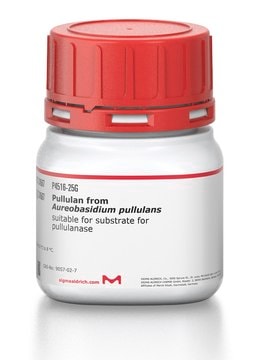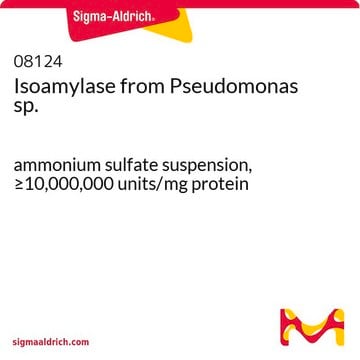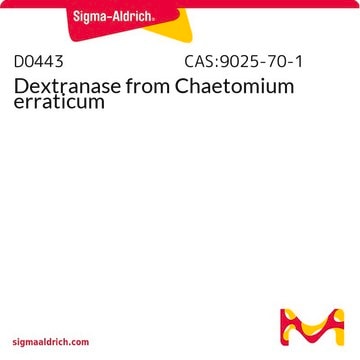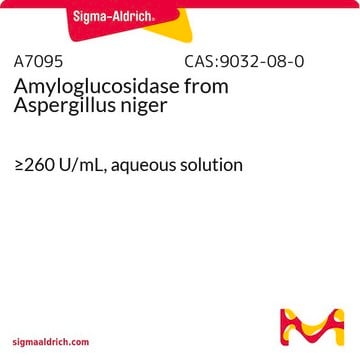E2412
Pullulanase microbial
Synonym(e):
Pullulanase microbial, Promozyme® D2
Anmeldenzur Ansicht organisationsspezifischer und vertraglich vereinbarter Preise
Alle Fotos(1)
About This Item
CAS-Nummer:
MDL-Nummer:
UNSPSC-Code:
12352204
NACRES:
NA.54
Empfohlene Produkte
Rekombinant
expressed in Bacillus subtilis
Qualitätsniveau
Form
aqueous solution
Spezifische Aktivität
≥1000 NPUN/g
Lagertemp.
2-8°C
Anwendung
Pullulanase is a glucanase that degrades pullulan. It is commonly used for starch-debranching as well as to study polysaccharide utilization.
Biochem./physiol. Wirkung
Type I pullulanases specifically hydrolyse α-1,6 linkages, while type II pullulanases are also able to hydrolyse α-1,4 linkages.
Sonstige Hinweise
View more information on enzymes for complex carbohydrate analysis at www.sigma-aldrich.com/enzymeexplorer
Rechtliche Hinweise
Ein Produkt der Novozyme Corp.
Novozym is a registered trademark of Novozymes A/S
Promozyme is a trademark of Novozymes Corp.
Lagerklassenschlüssel
12 - Non Combustible Liquids
WGK
WGK 1
Flammpunkt (°F)
Not applicable
Flammpunkt (°C)
Not applicable
Analysenzertifikate (COA)
Suchen Sie nach Analysenzertifikate (COA), indem Sie die Lot-/Chargennummer des Produkts eingeben. Lot- und Chargennummern sind auf dem Produktetikett hinter den Wörtern ‘Lot’ oder ‘Batch’ (Lot oder Charge) zu finden.
Besitzen Sie dieses Produkt bereits?
In der Dokumentenbibliothek finden Sie die Dokumentation zu den Produkten, die Sie kürzlich erworben haben.
Kunden haben sich ebenfalls angesehen
Nasima Chorfa et al.
Polymers, 14(10) (2022-05-29)
In this work, a valorization of the starch stemming from downgraded potatoes was approached through the preparation of starch nanoparticles using different physical methods, namely liquid and supercritical carbon dioxide, high energy ball milling (HEBM), and ultrasonication on the one
Christopher C Ibenegbu et al.
Microbial cell factories, 21(1), 251-251 (2022-11-30)
The starch in waste bread (WB) from industrial sandwich production was directly converted to ethanol by an amylolytic, ethanologenic thermophile (Parageobacillus thermoglucosidasius strain TM333) under 5 different simultaneous saccharification and fermentation (SSF) regimes. Crude α-amylase from TM333 was used alone
K A Smith et al.
Journal of bacteriology, 171(4), 2116-2123 (1989-04-01)
We have cloned a pullulanase gene from Bacteroides thetaiotaomicron. The pullulanase expressed from this clone in Escherichia coli was cell associated and soluble and had a molecular mass of 72 kilodaltons by gel filtration. Maxicell analysis of proteins coded by
Johanne Mørch Jensen et al.
Protein expression and purification, 79(2), 217-222 (2011-05-05)
The limit dextrinase inhibitor (LDI) from barley seeds acts specifically on limit dextrinase (LD), an endogenous starch debranching enzyme. LDI is a 14 kDa hydrophobic protein containing four disulfide bonds and one unpaired thiol group previously found to be either
Guodong Liu et al.
Carbohydrate polymers, 98(1), 995-1001 (2013-08-31)
This study aims to investigate the physicochemical and extended-release properties of amorphous debranched starch (ADBS) that is a linear short chain amylose derived from pullulanase enzymatic modification. The results show the completely amorphous ADBS was soluble in cold water, which
Unser Team von Wissenschaftlern verfügt über Erfahrung in allen Forschungsbereichen einschließlich Life Science, Materialwissenschaften, chemischer Synthese, Chromatographie, Analytik und vielen mehr..
Setzen Sie sich mit dem technischen Dienst in Verbindung.










